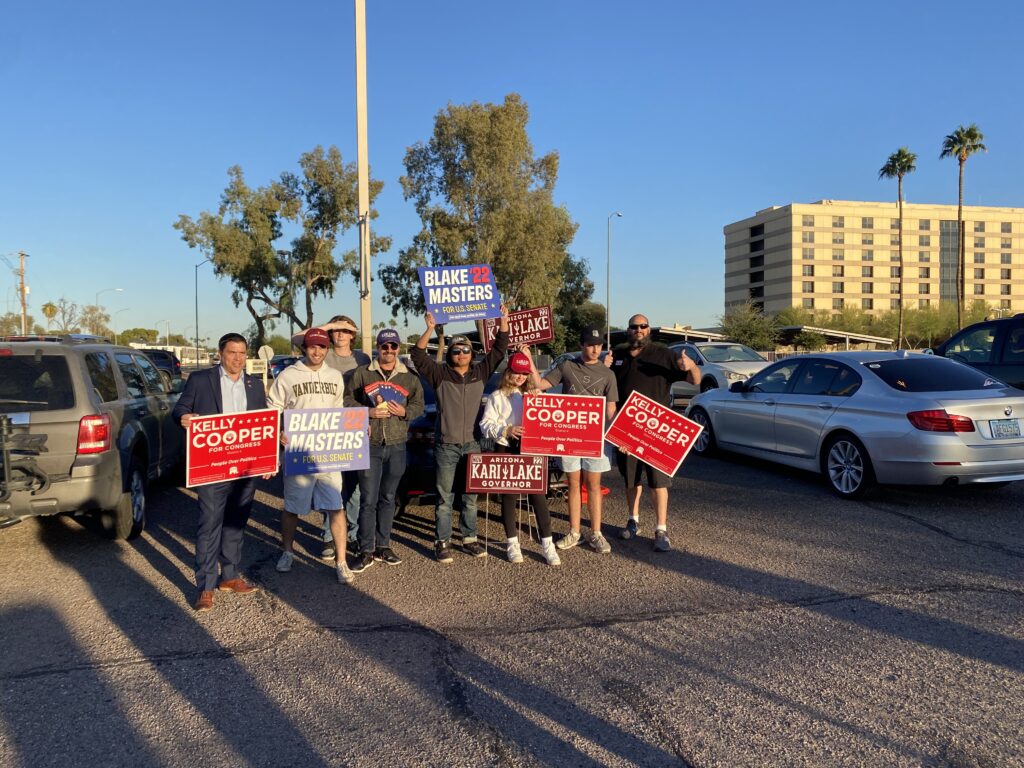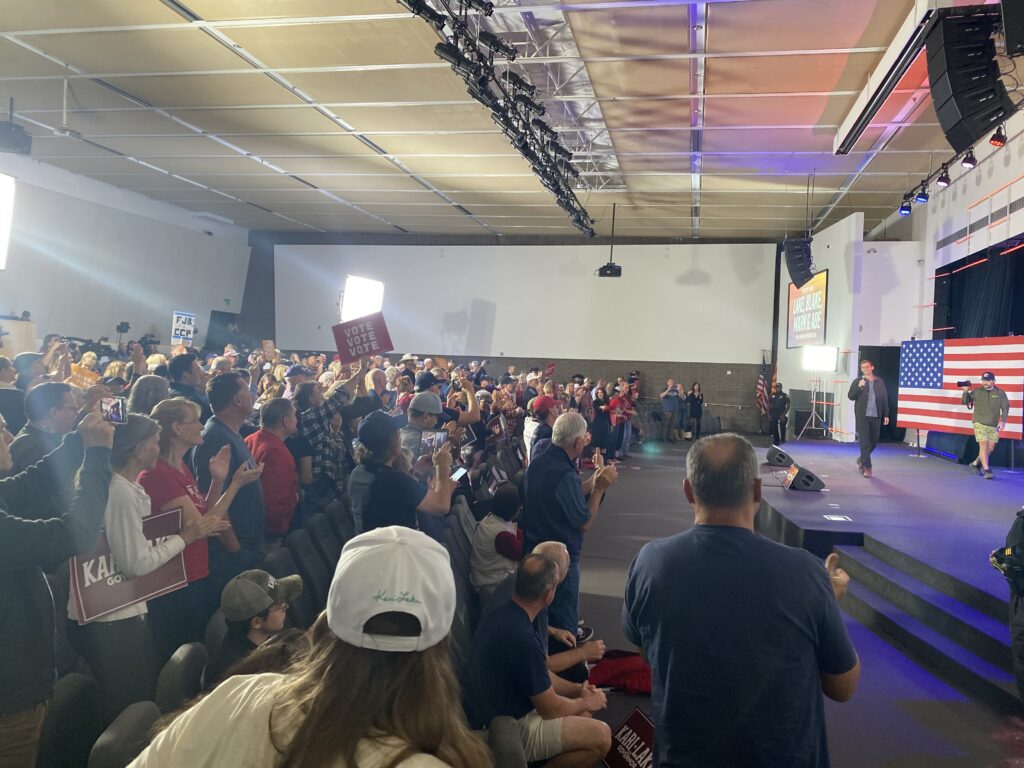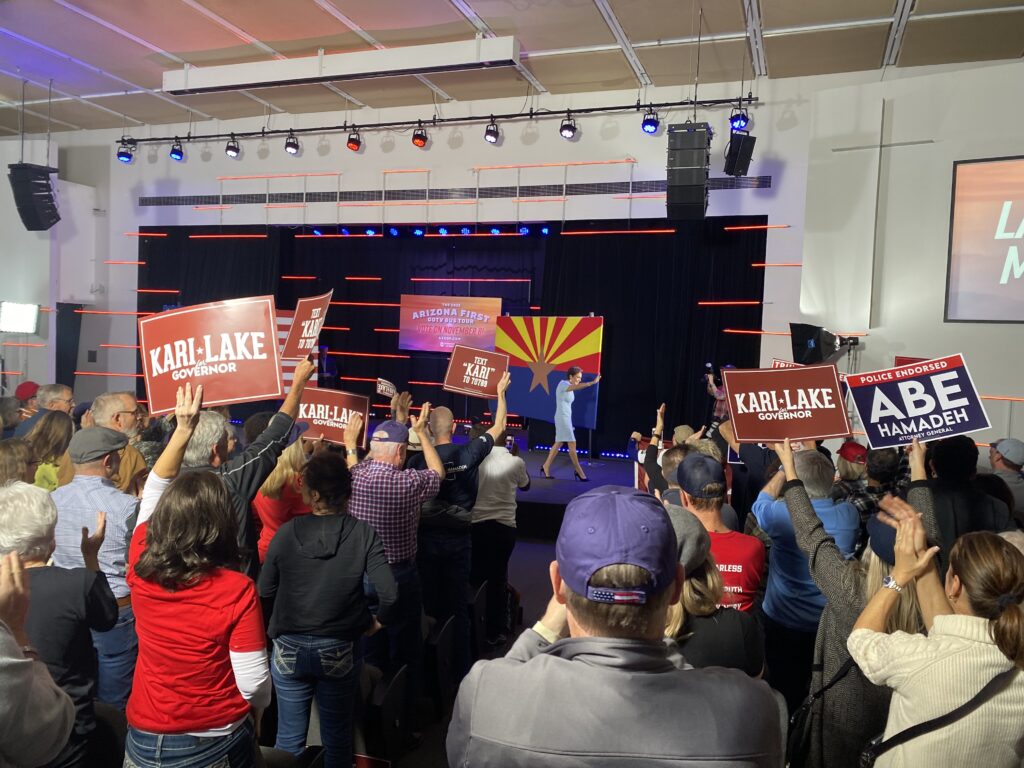In Final Arizona Push, Blake Masters Blasts The Washington Establishment
PHOENIX — Arizona Republican Senate nominee Blake Masters, a political novice who has never run for elected office, is in a statistical tie with Democrat incumbent Mark Kelly heading into Election Day, and he’s done it without much help from Senate Minority Leader Mitch McConnell.
“My job is to win with or without Mitch McConnell’s money, and I think we’re on track to win without,” Masters told The Federalist in an exclusive interview on the first day of his finalé bus tour this past weekend.

Two months ago, McConnell’s super PAC to reclaim the majority in the upper chamber opened September with an axe to the rest of its planned spending against Kelly. With Masters down 6 points in the polls against a Democrat who narrowly captured the seat just two years ago, the Senate Leadership Fund gutted $18 million from the race. Kelly won by fewer than 80,000 votes in 2020 and tied himself to an unpopular president over his two years as a senator, voting 95 percent of the time with the Biden White House agenda. Instead, McConnell bankrolled the defense of GOP Alaska Sen. Lisa Murkowski, spending more than $5 million in a race between two Republicans.
“I try not to feel entitled to other people’s money,” Masters told The Federalist on Saturday. “That’s a left-wing value. I’d be like [Alexandria Ocasio-Cortez] if I felt entitled to other people’s money. So when Mitch McConnell cut funding for Arizona, I could have gotten mad, I could have just started throwing bombs at him in the media, but I didn’t.”
Masters didn’t need to. Where McConnell has chosen to spend money this cycle speaks for itself. Instead of throwing support and funding behind Masters to flip a seat to the GOP, he has bent over backward to protect old-guard Republicans from insurgent GOP candidates who have pledged not to support the octogenarian lawmaker for another term in leadership, even if it means sacrificing chances to reclaim a Senate majority.
If Masters prevails on Tuesday without McConnell’s aid, it will be yet another sign of the new era of Republican politics, in which young, populist outsiders forge a new GOP without asking the establishment for permission.
Masters, who announced during the crowded state primary that he would cast his vote for a more conservative alternative for leader should one arise, never bowed to McConnell in order to garner the Republican Senate chief’s approval and the money that comes with it. McConnell made clear this fall that his money comes with strings attached, and Masters was willing to cut them.
“I’ve said I’m going to vote for the most conservative person running,” Masters told The Federalist, maintaining a posture of defiance to the party establishment that has come to define his campaign.
A New Generation of Republican Leadership
As far as McConnell is concerned, the threat Masters poses is about more than a vote for Senate leadership. It’s also about the generational change Masters represents: a new brand of bold, conservative populism that the candidate pledges to bring to the upper chamber, undermining old-guard Republicanism altogether.
In many ways, Masters is a traitor to his class. A privileged elite from Silicon Valley with degrees from Stanford and Stanford Law, Masters left the fortune of California’s lucrative tech industry to run as a conservative populist for the Arizona Senate seat held by Kelly, an astronaut. Like Ohio’s J.D. Vance, who is also running as a first-time candidate this cycle, Masters is a protégé of billionaire venture capitalist Peter Thiel, a rare conservative operating in the belly of left-wing America. Thiel pumped $15 million into each campaign through the primaries. If Vance, 38, and Masters, 36 — both of whom rail against Big Tech as a menace to democracy — prevail on Tuesday, they will represent ex-Silicon Valley insiders working to reshape conservatism and the Republican Party itself.
Their message has clearly picked up steam among a Republican base energized to turn out for their respective candidates in the midterms, which are historically hostile to the president’s party. During the final days of the primary campaign in Arizona, Masters maintained the momentum he built over the contest with a double-digit lead in the polls: He beat the runner-up by 12 points for the nomination.
Activists Energized by Masters’ Appeal
Vincent La is a 27-year-old software engineer from California who moved to Arizona in May of last year, alienated by the far-left takeover of the Golden State. As the sun set over the Arizona desert Friday night, La was preparing to canvass for the Republican slate of candidates in the Phoenix suburbs with local congressional candidate Kelly Cooper and several activists. None looked older than 30.

La said this year is the most involved he’s ever been in an election. He pointed to Masters as his favorite candidate, even during the primary.
“I thought he knew what time it was,” La told The Federalist, saying Masters’ antagonism of Big Tech’s empire motivated his vote. “I thought he knew what Republicans needed to do.” Others cited the candidate’s contagious energy.
Ariane Buse also recently fled California for Arizona, disillusioned by the former’s downward spiral under left-wing leaders. Asked in the packed auditorium of Scottsdale’s Dream City Church, the last leg of Masters’ bus tour on Saturday, if she trusted Masters considering his background as a first-time candidate coming from California, Buse was unconcerned and complimented his intensity.
“I think he’s young, he’s excited to do something, he’s from Tuscon, he knows what this state needs. I think he’s got great energy,” Buse told The Federalist.
If Masters was tired on the sixth and final stop of just day one of a three-day bus tour, it was hardly noticeable. On stage, he attacked inflation, the media, and the border crisis, particularly highlighting the fentanyl flooding the country as “poison.”

“I’m refusing the term ‘overdosing,’” Masters said, describing victims of the crisis as being “poisoned,” while he blasted “limousine liberals” and “champagne socialists” as apathetic to the problems their policies create.
It’s the kind of forceful rhetoric Republican voters have come to expect of their leaders, and it’s why Masters has resonated with grassroots conservatives in Arizona.
Ashley Earle is a mother of three children who lives in Scottsdale with her husband. She grew up in Arizona, married her high school sweetheart, and moved their family to the Virginia Appalachians before recently returning home. She homeschools the kids while her husband runs a small business, coping with inflation as they cling to the American dream they’ve found in the Grand Canyon state. Americans everywhere are struggling with rising prices, but Central Arizona is suffering the highest rate of inflation in the entire country.
Earle didn’t hesitate when asked outside the Dream City Church auditorium the first thing that comes to mind when she hears the name “Blake Masters.”
“I love his passion,” she said with a smile, comparing their families, which both have three young children. “He understands what it’s like to be a parent in our age group.”
When asked her thoughts about Republican leadership, Earle’s smile dissipated.
“I feel like they’re afraid of Blake,” she said.
When pressed backstage on what his success thus far, without support from the top elected Republican in the country, means for the party, Masters said it shows what voters are looking for.
“I think it kind of shows I’m more in touch with what people want right now,” Masters said. “I’m running on this very bold but very commonsense America First agenda. It’s not complicated.”
It also shows that the America First agenda, which was put forth by President Donald Trump six years ago and dubbed “Trumpsim,” has begun to transcend that label and become a larger movement beyond the man himself. Kari Lake, a local charismatic news anchor who left her nearly 30-year television career to run for governor, was greeted at the final stop as a rock star after campaigning on a Trump-inspired “Arizona First” agenda.

The state’s Republican Senate and gubernatorial candidates are running as a ticket, encouraging Arizonans to vote “Lake and Blake.”
The Tide Is Already Turning in Washington
Masters has been able to capitalize on the few D.C. institutions and individuals who are responsive to the grassroots activists who make up the Republican base, betting that the way to win elections moving forward is to cater to the people and not the pundits.
Kelli Ward, the chairwoman of the Arizona Republican Party, explained over lunch in south Phoenix that this year’s slate of candidates aligned against the coastal establishment was a directive for Washington to heed the shift in mood.
“The politicians have to remember who they work for, and I think that in Arizona we sent that message,” said Ward.
After McConnell pulled $18 million from Masters’ competitive contest only to dump $5 million into Alaska, other groups such as Heritage Action for America began jumping in to fill the gap. The Sentinel Action Fund, a project of Heritage Action to support candidates with widespread support among the grassroots, has put more than $8 million behind Masters and against his well-funded opponent, who is battling for re-election with nearly $80 million. The group did the same for Gen. Don Bolduc in New Hampshire, pumping more than $2.15 million into the GOP bid to unseat incumbent Democrat Sen. Maggie Hassan after McConnell axed $5.6 million for the Granite State. Last month, Bolduc joined Masters in maintaining opposition to McConnell for another term as Senate leader.
Florida Sen. Rick Scott, the National Republican Senatorial Committee chairman, has spent more on Masters’ race than on any other candidate this cycle. Scott, who publicly admonished McConnell in September when the minority leader trashed the quality of this year’s candidates, has put nearly $10 million from the NRSC behind the Arizona effort to bring down Kelly.
After months of campaigning tied the polls against the odds, local GOP leaders worry that Masters still might lose over low turnout brought by complacency and that a revolution in the Republican Party might fail. If Republicans want to win — and they want to win with generational change in Washington — they will need to show up to the voting booth.
Tristan Justice is the western correspondent for The Federalist. He has also written for The Washington Examiner and The Daily Signal. His work has also been featured in Real Clear Politics and Fox News. Tristan graduated from George Washington University where he majored in political science and minored in journalism. Follow him on Twitter at @JusticeTristan or contact him at Tristan@thefederalist.com.





Comments are closed.